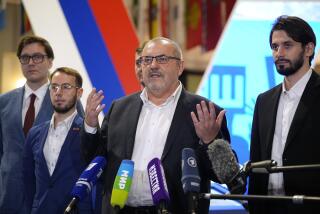Unofficial Candidate Yeltsin Seems Set on Being Russia’s Comeback Kid
- Share via
MOSCOW — What seemed implausible a few weeks ago is now all but official: Russian President Boris N. Yeltsin--who stumbled through the past year with an unpopular war, single-digit approval ratings and heart ailments that confined him to bed for nearly four months--is up and running for reelection.
He has yet to proclaim his candidacy for the June 16 ballot, but his every public appearance, word and decision since he checked out of a sanitarium last month leave little doubt that Russia’s first freely elected leader, who turns 65 next week, is unwilling to retire.
The comeback bid has dismayed his dwindling ranks of liberal supporters and some Kremlin advisors, not only because of doubts that Yeltsin can win but because he bears so little resemblance to the champion of democracy and free markets who rose to power in 1991 on the ruins of the Soviet Union.
In the month since Communists and ultranationalists finished first and second in parliamentary elections, Yeltsin has adopted a blustery tone and a risky strategy of co-opting those foes in order to beat them in June.
He has dumped Andrei V. Kozyrev, his pro-Western foreign minister, and First Deputy Prime Minister Anatoly B. Chubais, the last leading free marketeer in his administration. He replaced Kozyrev with Yevgeny M. Primakov, a Soviet-era survivor and chief of Russia’s worldwide spy network.
Last week, Yeltsin chose to end a hostage crisis with indiscriminate shelling of a Russian village held by separatist rebels from Chechnya, closing the door on attempts to end the 13-month-old war with negotiations. And he named a hawk on Chechnya, Nikolai D. Yegorov, as his chief of staff.
“These actions make it crystal clear that the Yeltsin government can no longer be called a reformist government,” said Viktor L. Shennis, a democrat in the new parliament. “In the struggle between Yeltsin and the Communists, we could find ourselves like the German voters who had to choose in 1932 between Hindenburg and Hitler.”
Yeltsin, 23 pounds lighter after his recent convalescence, began acting like a candidate following a debate among his advisors on the Dec. 17 parliamentary vote. Some argued that the best way to preserve his legacy as the father of Russian democracy would be to choose a protege with a better chance of winning in June.
“It’s more important to go for continuity of the program than to change it and run with an unpopular leader,” one Kremlin analyst said, repeating his argument in the debate. “Leaders exhaust themselves everywhere. Reelection of the same man here is impossible. . . . Yeltsin must find a successor or he jeopardizes his place in history.”
That view appears to have lost out, the analyst said, because the government party led by Yeltsin’s prime minister, Viktor S. Chernomyrdin, fared poorly in the parliamentary election--it finished third, with 10% of the vote--and because the president sees no capable heir.
Other sources said Yeltsin has been urged to run by his hard-line Kremlin security chief, Gen. Alexander V. Korzhakov, and his top personal aide, Viktor V. Ilyushin, who fear losing their positions. They are said to have overcome objections by Naina Yeltsin that her husband, who suffered bouts of myocardial ischemia--a lack of blood supply to the heart--in July and October, is too weak to survive a new term of four years.
Last week, Yeltsin named Deputy Prime Minister Oleg N. Soskovets to head an exploratory committee for the Kremlin’s presidential campaign. Earlier, Yeltsin told reporters that he felt “pushed” toward running by the threat of a Communist comeback.
“In order to preserve the path on which Russia is now moving, firm presidential power is needed,” he said. “In order to prevent deviations, it would be a good idea to run for a second term. But there are also a number of obstacles.”
Among the obstacles is Yeltsin’s dismal popularity--worn down by poorly managed reforms that have bred crime and corruption and impoverished more people than they have helped. The Communists and Vladimir V. Zhirinovsky’s ultranationalists capitalized on the national mood, winning 22% and 11% of the parliamentary vote, respectively.
Yeltsin’s strategy for June, Kremlin watchers say, is focused on how to beat Zhirinovsky and another popular nationalist, retired Gen. Alexander I. Lebed, so he can reach a two-man runoff against Gennady A. Zyuganov, the likely Communist candidate and front-runner.
Looking vigorous and combative, Yeltsin hinted at his strategy at a news conference Friday. He called for tighter security cooperation among former Soviet republics to counter an eastward expansion of the North Atlantic Treaty Organization and defended his crackdown against Chechen rebels, saying, “Mad dogs must be shot.”
He accused Chubais of “selling off our major enterprises for a song” and asserted that if the minister had been fired earlier, the government party could have doubled its December vote and won 20%.
With Chubais no longer there to curb inflationary spending, Yeltsin is expected to boost pensions and government workers’ salaries. If economic recovery stalls, he could blame Chernomyrdin and fire him.
Still, the Yeltsin strategy is risky. Russians willing to accept a merciless response to Chechen hostage-takers now may lose patience with Yeltsin if, as seems likely, his hapless army cannot defeat the rebels by spring. And as Mikhail S. Gorbachev learned in the dying days of the Soviet Union, hard-line foes can be unforgiving.
“It’s going to take a really radical strategy for Yeltsin to win,” said Michael McFaul, a Stanford University professor who watched the December campaign closely.
“People are going to have to be re-convinced to vote for this guy. I’m not sure his advisors understand this yet, that it’s not enough for him to say, ‘I’m Yeltsin, and I’m running again.’ ”
More to Read
Sign up for Essential California
The most important California stories and recommendations in your inbox every morning.
You may occasionally receive promotional content from the Los Angeles Times.













